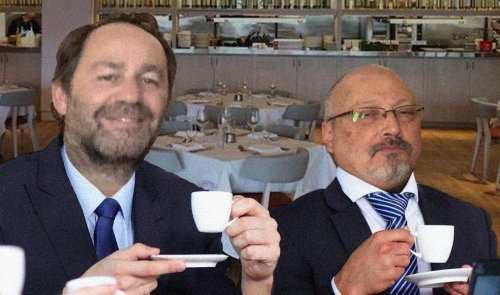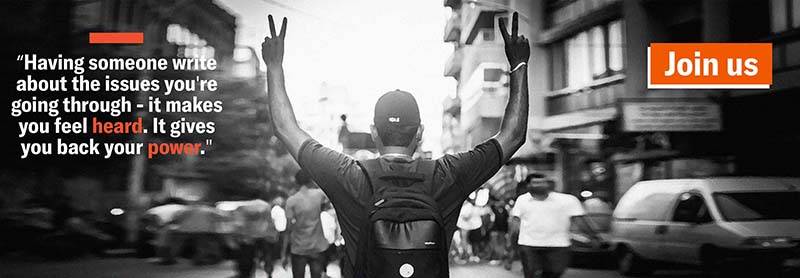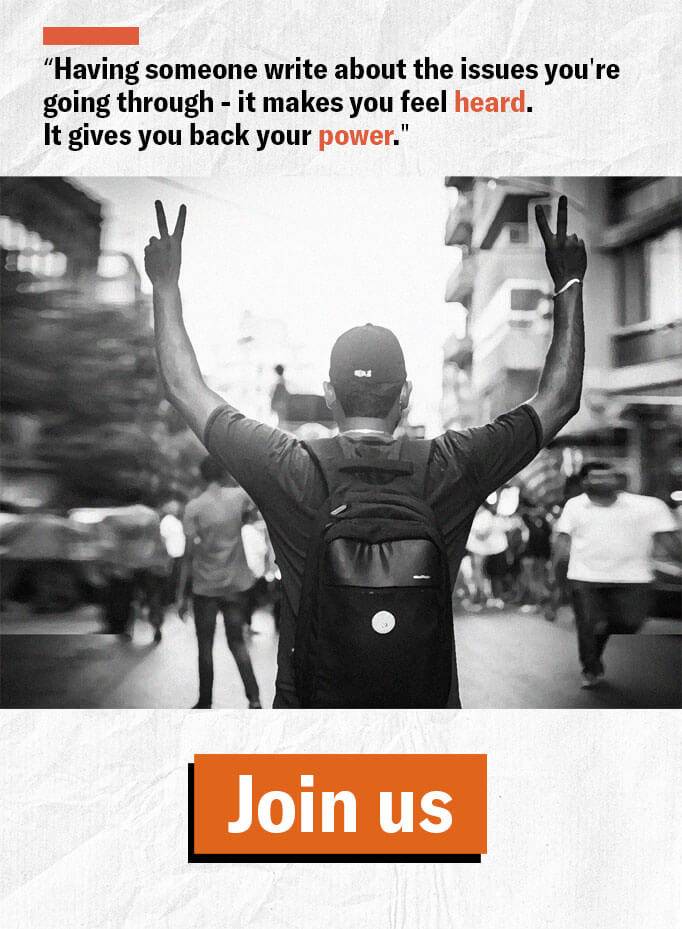A Stroke of Genius
Jamal started with a bang. His first article called on the Muslim Brotherhood to quit politics. Titled as such, the article expressed Jamal’s then state of mind. He was gloating over the victories of this political Islam movement, he wrote: “The Muslim Brothers might not know that they have won, and that it is time they put the Party aside for it worries some of the region’s leaders. Political Islam is now the model of choice of large segments in Muslim societies, and only democracy is preventing them from governing or participating in government. With that, their moto should now be “Democracy is the Solution” rather than their previous moto “Islam is the Solution”". Jamal laid it all out. He revealed his respect for the Muslim party and its long history, yet he clearly stated that religion and politics are not fungible, an opinion shared by most Raseef22 readers. He viewed democracy, not ideology, as the foundation of good rule. The article was widely shared and effective, Jamal told a common friend whom I called last week to lament over our tragic loss. This friend said Jamal was happy writing again in Arabic and had the support of his large audience. But it seems depression shadowed him all the time. One day he messaged me saying: “I need motivation, I feel quite depressed these days”. Jamal suggested many ideas for Raseef22, he particularly enjoyed the Culture section and referred to us the best writers in the field who share his passion for excellence. One day he said: Let us work on a listicle similar to the one published today (March 30) in the Washington Post on the top 40 films that influenced our daily language; and suggested the Egyptian line: “I rely on God and work as a Belly Dancer”. This suggestion reflected Jamal’s state of mind; he must have needed to make career decisions at the time, an eminent journalist who realised he would be marginalized if he does not take matters into his own hands, he added saying: “These days I must rely on the little money I can earn from writing”. At the time, I did not know that his family back in Saudi Arabia was not able to leave the Kingdom, they were effectively held hostage, which must have been a source of daily torment.Back to MBS Reforms
In his second article for Raseef22, Jamal wrote: “Crown Prince Mohamed bin Salman is leading a reform campaign that will change the face and fabric of Saudi society…. In short, he is leading Saudi Arabia and Saudis from religious orthodoxy which was reflected in everyday life, society and the arts to the rich and joyful contemporary life.” Jamal particularly focused on labour market reforms which he considered key for any real reform, for Jamal circled in the world of affluent businessmen, leaders and royals, and clearly understood the Saudi economy. He despised the widely used “sponsorship” system, in which Saudis lend their name to foreign nationals who aren’t allowed to work directly in the Saudi markets, creating a lazy non-productive economy based on rentier capitalism. He wrote: “Reforming economic policy and job creation are the real renaissance of Saudi Arabia and should start from the poor neighbourhoods”—a clear poke at the Crown Prince’s Vision 2030.The Saudi’s Guide to Entertainment
On the sudden interest in state sponsored Entertainment, Jamal wrote: What we, Saudis, should care for most is the transparency of the spending on entertainment, which could be happening at the expense of eroding subsidies on basic goods. Society itself wants entertainment and will supply it if allowed, but it cannot provide subsidies for those that need it. Maybe this is just a way to kick off the industry; let us wait and see and let us not forget that enjoying life also requires stability and justice. Here Khashoggi again is focusing on justice and equity, realizing a state without equity and law is but a failed dictatorship scared of pluralism and the future, as was the case in the mid 80s in Saudi when everything was banned in the name of religion, giving free reign to religious authorities which had infinite lists of banned activities and restricted the population for too long.Jamal at the Oslo Freedom Forum
At the Oslo Freedom Forum, which Jamal says he attended as a journalist concerned with freedoms rather than an activist, Jamal was like a child visiting a candy store for the first time. Thoroughly enjoying the panels and the diversity of issues presented in this three-day conference that gathered movers and shakers in the world of Human Rights, Jamal noted the weak representation of the Arab world. A friend at Human Rights Watch invited me to the 2017 edition of the Oslo Freedom Forum, so I could clearly relate to Jamal’s joy, and there I met Manal El-Sharif the Saudi activist arrested for driving while being a woman, who got a standing ovation when she shared her stories. Jamal called me from Oslo, with an idea of gathering a few other journalist friends of his from around the Arab world to cover trending stories, he suggested adding a newsroom to Raseef22 based on feature articles rather than agency news. Jamal wrote: “I attended the Oslo Freedom Forum, a conference that guarantees you a booking in jail if you are planning to go back to our countries, it actually celebrates opposition, freedom and human rights. Here they applaud the opposition, the more the story is painful the more they respect those who tell it…. I attended as a journalist, not an activist, I am proud of my profession, a journalist who reports what he sees and thinks, though I applaud activists for without men like Gandhi and Mandela and others before them, life would not be the same for many. I remind myself that the Prophet Mohamad’s PBUH own call was one of freedom and choice.”Fear of Prison
"We live in an era where jail is one of the tools of enslaving and controlling the masses. Laws are no longer protecting us, Jail has become the weapon of the ruler and his regime. It is no longer a punishment, it is part of the political bargaining and pressure tools to control society.” Jamal was afraid of ending up in jail like many other journalists around the Arab world, he wanted to go home, but did not want to experience jail, and in another article, went on to refute the idea that jail is a necessary evil for all activists to get ahead with their cause. Jamal could not bear the idea of a cell. He recounted a television interview along with his “friend" Ali Shihabi – who runs the Arabia Foundation in Washington D.C. – during which the host asked Shihabi what would happen to Jamal if he went home. Shihabi confidently replied: Jails in Saudi Arabia are better than most jails in the Middle East. Jamal was busy in late summer, on September 25th , I invited him for lunch in Washington DC to which he replied he was in Istanbul. On the 28th of September he said he was sending me an article, he wrote to me saying: "I want to write, it has been a while since I did". That was the end of a good friendship.Raseef22 is a not for profit entity. Our focus is on quality journalism. Every contribution to the NasRaseef membership goes directly towards journalism production. We stand independent, not accepting corporate sponsorships, sponsored content or political funding.
Support our mission to keep Raseef22 available to all readers by clicking here!






Join the Conversation
Anonymous user -
2 days agoUn message privé pour l'écrivain svp débloquer moi sur Facebook
Anonymous user -
2 days agoالبرتغال تغلق باب الهجرة قريبا جدااا
Jong Lona -
2 days agoأغلبهم ياخذون سوريا لان العراقيات عندهم عشيرة حتى لو ضربها أو عنقها تقدر تروح على أهلها واهلها...
ghdr brhm -
3 days ago❤️❤️
جيسيكا ملو فالنتاين -
5 days agoجميل جدا أن تقدر كل المشاعر لأنها جميعا مهمة. شكرا على هذا المقال المشبع بالعواطف. احببت جدا خط...
Tayma Shrit -
1 week agoمدينتي التي فارقتها منذ أكثر من 10 سنين، مختلفة وغريبة جداً عمّا كانت سابقاً، للأسف.